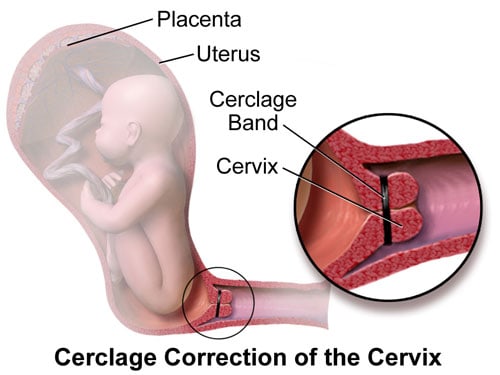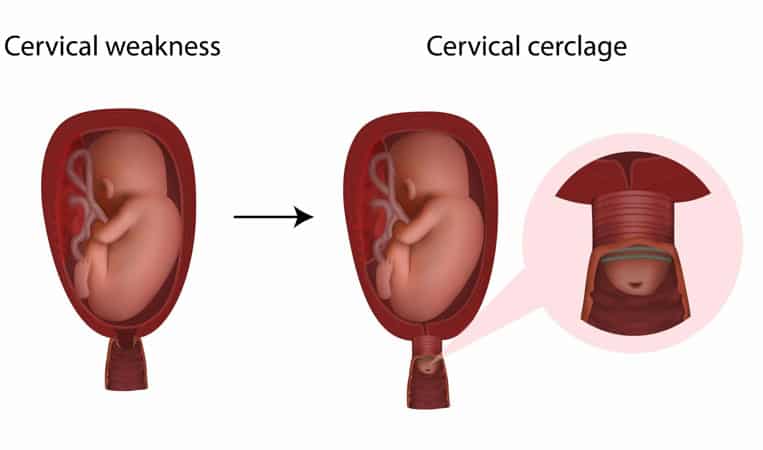OS Tightening
What is Cervical Cerclage?
- Cervical cerclage is a surgery which includes tightening of the cervical opening during pregnancy. During pregnancy, the fetus grows and develops in the mother’s uterus (womb). At the time of delivery the muscles of the uterus contract (shorten) and expand alternately to push the baby out. The uterus leads to the cervix which leads to the vagina through which the baby comes out.
- The cervix is closed throughout the pregnancy to protect the fetus developing within the uterus. In some women, the cervical opening might be lax or it may open up later during pregnancy. To correct this abnormality, cervical cerclage is performed. The cervix is closed or made tighter by stitching its opening with surgically designed thread or it is closed with a band.

Why is Cervical Cerclage Required?
As mentioned above, cervical cerclage is done only in pregnant women. However, it is not required in every case of pregnancy. Some of the indications that cervical cerclage is needed are mentioned below:
- Preventing premature delivery: Cervical insufficiency can cause the cervix to open too early in pregnancy, increasing the risk of premature delivery. Cervical cerclage can help to keep the cervix closed and prevent premature delivery.
- Supporting pregnancy with multiple gestations: Women who are pregnant with multiple babies are at higher risk of cervical insufficiency and premature delivery. Cervical cerclage can help to support the cervix and prevent premature delivery in these cases.
- Previous cervical surgery: Women who have had previous surgery on the cervix, such as a cone biopsy or loop electrosurgical excision procedure (LEEP), may have a weakened cervix that is more prone to opening early. Cervical cerclage can help to support the cervix and prevent premature delivery in these cases.
- Cervical length: A short cervix is also a risk factor for preterm birth. If the cervix is measured to be too short during pregnancy, cervical cerclage can be recommended to prevent the cervix from opening too early.
When should you call a doctor after cervical cerclage?
- Call your healthcare provider right away if you experience any of the following:
- A high fever (over 100 degrees Fahrenheit [37.7 degrees Celsius]).
- Contractions or lower abdominal pain that comes at regular intervals.
- Foul-smelling vaginal odour or discharge.
- Water breaking or leaking.
- Excessive bleeding.
What happens before a cervical cerclage procedure?
- Before a cervical cerclage procedure, your healthcare provider will review your medical history and discuss any past complications you may have had with pregnancies or cervical surgeries. They will perform a cervical exam, using a speculum to visualize the cervix and may also do a transvaginal ultrasound. They will advise you to abstain from sexual intercourse for a week before the procedure.
- It’s common to feel anxious or uncertain before the procedure, but this is a good opportunity to address any concerns you may have with your healthcare provider and ask any questions you may have about the procedure

What happens during a cervical cerclage procedure?
During your cervical cerclage procedure:
- You’ll lie back on an examination table with your legs open and both of your feet in stirrups similar to when you have a vaginal exam.
- Your healthcare provider will give you some pain-numbing medication, such as a local anaesthetic, so you won’t feel any pain or discomfort during the procedure. You may feel a small pinch when the needle is inserted into your cervix to numb it.
- After the anaesthesia takes effect, your healthcare provider will stitch your cervix closed with strong sutures, tightening it until it’s secure.
What happens after this procedure?
- Following the cervical cerclage procedure, you will be required to stay in your healthcare provider’s office or the hospital for a few hours to ensure that there are no complications. You will be able to go home on the same day. To prevent any cervical infection, your healthcare provider may prescribe antibiotics.
- On the day of the procedure, you should plan to rest and avoid attending school or work. It’s recommended that you allow sufficient time for the stitches to heal, which is typically about 10 days, before engaging in any strenuous activities or sexual intercourse. To monitor your pregnancy, it’s essential to follow your healthcare provider’s aftercare instructions and attend all follow-up appointments.
Call KK Speciality Clinic and Hospital in Mumbai to schedule a consultation for pregnancy difficulties. One of Mumbai’s premier hospitals for all types of pregnancy treatment.
Address: Ground Floor, Gayatri Krupa, Behind Anderpada bus stop, opp. Majestic Hotel, Dahisar West, Mumbai, Maharashtra 400068.
Contact: 9930775754
